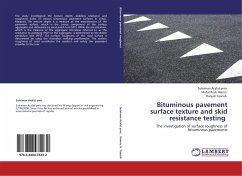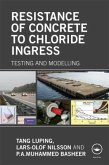- Broschiertes Buch
- Merkliste
- Auf die Merkliste
- Bewerten Bewerten
- Teilen
- Produkt teilen
- Produkterinnerung
- Produkterinnerung
First-time paperback of history and sociology of science work, showing public resistance as a constructive force in technological development.
Andere Kunden interessierten sich auch für
![Fatigue behaviour and creep resistance of Fe-Ni superalloy Fatigue behaviour and creep resistance of Fe-Ni superalloy]() Kazimierz J. DuckiFatigue behaviour and creep resistance of Fe-Ni superalloy15,99 €
Kazimierz J. DuckiFatigue behaviour and creep resistance of Fe-Ni superalloy15,99 €![Effect of Polypropylene and Steel fibers on Fire Resistance of UHPC Effect of Polypropylene and Steel fibers on Fire Resistance of UHPC]() Ahmed SeyamEffect of Polypropylene and Steel fibers on Fire Resistance of UHPC33,99 €
Ahmed SeyamEffect of Polypropylene and Steel fibers on Fire Resistance of UHPC33,99 €![Bituminous pavement surface texture and skid resistance testing Bituminous pavement surface texture and skid resistance testing]() Suleiman Arafat yeroBituminous pavement surface texture and skid resistance testing32,99 €
Suleiman Arafat yeroBituminous pavement surface texture and skid resistance testing32,99 €![Resistance of Concrete to Chloride Ingress Resistance of Concrete to Chloride Ingress]() Luping TangResistance of Concrete to Chloride Ingress256,99 €
Luping TangResistance of Concrete to Chloride Ingress256,99 €![Resistance of Concrete to Chloride Ingress Resistance of Concrete to Chloride Ingress]() Luping TangResistance of Concrete to Chloride Ingress102,99 €
Luping TangResistance of Concrete to Chloride Ingress102,99 €![Corrosion Resistance Enhancement of the Materials Surface Corrosion Resistance Enhancement of the Materials Surface]() Corrosion Resistance Enhancement of the Materials Surface73,99 €
Corrosion Resistance Enhancement of the Materials Surface73,99 €![Abrasion Resistance of Materials Abrasion Resistance of Materials]() Abrasion Resistance of Materials84,99 €
Abrasion Resistance of Materials84,99 €-
-
-
First-time paperback of history and sociology of science work, showing public resistance as a constructive force in technological development.
Hinweis: Dieser Artikel kann nur an eine deutsche Lieferadresse ausgeliefert werden.
Hinweis: Dieser Artikel kann nur an eine deutsche Lieferadresse ausgeliefert werden.
Produktdetails
- Produktdetails
- Verlag: Cambridge University Press
- Seitenzahl: 438
- Erscheinungstermin: 29. Juni 2017
- Englisch
- Abmessung: 244mm x 170mm x 23mm
- Gewicht: 751g
- ISBN-13: 9780521599481
- ISBN-10: 0521599482
- Artikelnr.: 21351722
- Herstellerkennzeichnung
- Libri GmbH
- Europaallee 1
- 36244 Bad Hersfeld
- gpsr@libri.de
- Verlag: Cambridge University Press
- Seitenzahl: 438
- Erscheinungstermin: 29. Juni 2017
- Englisch
- Abmessung: 244mm x 170mm x 23mm
- Gewicht: 751g
- ISBN-13: 9780521599481
- ISBN-10: 0521599482
- Artikelnr.: 21351722
- Herstellerkennzeichnung
- Libri GmbH
- Europaallee 1
- 36244 Bad Hersfeld
- gpsr@libri.de
1. Resistance to new technology and its effects on nuclear power,
information technology and biotechnology Martin Bauer; 2. The crisis of
'progress' Alain Touraine; 3. Reinterpreting 'Luddism': resistance to new
technology in the British industrial revolution Adrian J. Randall; 4. The
changeability of public opinions about new technology: assimilation effects
in attitude surveys Danckler D. L. Daamen and Ivo A. van der Lans; 5.
'Technophobia': a misleading conception of resistance to new technology
Martin Bauer; 6. Patterns of resistance to new technologies in Scandinavia:
an historical perspective Kristine Bruland; 7. Henry Ford's relationship to
'Fordism': ambiguity as a modality of technological resistance John M.
Staudenmaier; 8. Resistance to nuclear technology: optimists, opportunists
and opposition in Australian nuclear history Roy M. Macleod; 9. New
technology in Fleet Street, 1975-80 Roderick Martin; 10. The impact of
resistance to biotechnology in Switzerland: a sociological view of the
recent referendum Marlis Buchmann; 11. The politics of resistance to new
technology: semiconductor diffusion in France and Japan until 1965 Antonio
J. J. Botelho; 12. User resistance to new interactive media: participants,
processes and paradigms Ian Miles and Graham Thomas; 13. The impact of
anti-nuclear power movements in international comparison Dieter Rucht; 14.
In the engine of history: regulators of biotechnology, 1970-86 Robert Bud;
15. Product, process, or programme: three cultures and the regulation of
biotechnology Sheila S. Jasanoff; 16. Learning from Chernobyl for the fight
against genetics? Stages and stimuli of German protest movements - a
comparative synopsis Joachim Radkau; 17. Individual and institutional
impacts upon press coverage of sciences: the case of nuclear power and
genetic engineering in Germany Hans Mathias Kepplinger; 18. Forms of
intrusion: comparing resistance to information technology and biotechnology
in the USA Dorothy Nelkin; 19. Towards a functional analysis of resistance.
information technology and biotechnology Martin Bauer; 2. The crisis of
'progress' Alain Touraine; 3. Reinterpreting 'Luddism': resistance to new
technology in the British industrial revolution Adrian J. Randall; 4. The
changeability of public opinions about new technology: assimilation effects
in attitude surveys Danckler D. L. Daamen and Ivo A. van der Lans; 5.
'Technophobia': a misleading conception of resistance to new technology
Martin Bauer; 6. Patterns of resistance to new technologies in Scandinavia:
an historical perspective Kristine Bruland; 7. Henry Ford's relationship to
'Fordism': ambiguity as a modality of technological resistance John M.
Staudenmaier; 8. Resistance to nuclear technology: optimists, opportunists
and opposition in Australian nuclear history Roy M. Macleod; 9. New
technology in Fleet Street, 1975-80 Roderick Martin; 10. The impact of
resistance to biotechnology in Switzerland: a sociological view of the
recent referendum Marlis Buchmann; 11. The politics of resistance to new
technology: semiconductor diffusion in France and Japan until 1965 Antonio
J. J. Botelho; 12. User resistance to new interactive media: participants,
processes and paradigms Ian Miles and Graham Thomas; 13. The impact of
anti-nuclear power movements in international comparison Dieter Rucht; 14.
In the engine of history: regulators of biotechnology, 1970-86 Robert Bud;
15. Product, process, or programme: three cultures and the regulation of
biotechnology Sheila S. Jasanoff; 16. Learning from Chernobyl for the fight
against genetics? Stages and stimuli of German protest movements - a
comparative synopsis Joachim Radkau; 17. Individual and institutional
impacts upon press coverage of sciences: the case of nuclear power and
genetic engineering in Germany Hans Mathias Kepplinger; 18. Forms of
intrusion: comparing resistance to information technology and biotechnology
in the USA Dorothy Nelkin; 19. Towards a functional analysis of resistance.
1. Resistance to new technology and its effects on nuclear power,
information technology and biotechnology Martin Bauer; 2. The crisis of
'progress' Alain Touraine; 3. Reinterpreting 'Luddism': resistance to new
technology in the British industrial revolution Adrian J. Randall; 4. The
changeability of public opinions about new technology: assimilation effects
in attitude surveys Danckler D. L. Daamen and Ivo A. van der Lans; 5.
'Technophobia': a misleading conception of resistance to new technology
Martin Bauer; 6. Patterns of resistance to new technologies in Scandinavia:
an historical perspective Kristine Bruland; 7. Henry Ford's relationship to
'Fordism': ambiguity as a modality of technological resistance John M.
Staudenmaier; 8. Resistance to nuclear technology: optimists, opportunists
and opposition in Australian nuclear history Roy M. Macleod; 9. New
technology in Fleet Street, 1975-80 Roderick Martin; 10. The impact of
resistance to biotechnology in Switzerland: a sociological view of the
recent referendum Marlis Buchmann; 11. The politics of resistance to new
technology: semiconductor diffusion in France and Japan until 1965 Antonio
J. J. Botelho; 12. User resistance to new interactive media: participants,
processes and paradigms Ian Miles and Graham Thomas; 13. The impact of
anti-nuclear power movements in international comparison Dieter Rucht; 14.
In the engine of history: regulators of biotechnology, 1970-86 Robert Bud;
15. Product, process, or programme: three cultures and the regulation of
biotechnology Sheila S. Jasanoff; 16. Learning from Chernobyl for the fight
against genetics? Stages and stimuli of German protest movements - a
comparative synopsis Joachim Radkau; 17. Individual and institutional
impacts upon press coverage of sciences: the case of nuclear power and
genetic engineering in Germany Hans Mathias Kepplinger; 18. Forms of
intrusion: comparing resistance to information technology and biotechnology
in the USA Dorothy Nelkin; 19. Towards a functional analysis of resistance.
information technology and biotechnology Martin Bauer; 2. The crisis of
'progress' Alain Touraine; 3. Reinterpreting 'Luddism': resistance to new
technology in the British industrial revolution Adrian J. Randall; 4. The
changeability of public opinions about new technology: assimilation effects
in attitude surveys Danckler D. L. Daamen and Ivo A. van der Lans; 5.
'Technophobia': a misleading conception of resistance to new technology
Martin Bauer; 6. Patterns of resistance to new technologies in Scandinavia:
an historical perspective Kristine Bruland; 7. Henry Ford's relationship to
'Fordism': ambiguity as a modality of technological resistance John M.
Staudenmaier; 8. Resistance to nuclear technology: optimists, opportunists
and opposition in Australian nuclear history Roy M. Macleod; 9. New
technology in Fleet Street, 1975-80 Roderick Martin; 10. The impact of
resistance to biotechnology in Switzerland: a sociological view of the
recent referendum Marlis Buchmann; 11. The politics of resistance to new
technology: semiconductor diffusion in France and Japan until 1965 Antonio
J. J. Botelho; 12. User resistance to new interactive media: participants,
processes and paradigms Ian Miles and Graham Thomas; 13. The impact of
anti-nuclear power movements in international comparison Dieter Rucht; 14.
In the engine of history: regulators of biotechnology, 1970-86 Robert Bud;
15. Product, process, or programme: three cultures and the regulation of
biotechnology Sheila S. Jasanoff; 16. Learning from Chernobyl for the fight
against genetics? Stages and stimuli of German protest movements - a
comparative synopsis Joachim Radkau; 17. Individual and institutional
impacts upon press coverage of sciences: the case of nuclear power and
genetic engineering in Germany Hans Mathias Kepplinger; 18. Forms of
intrusion: comparing resistance to information technology and biotechnology
in the USA Dorothy Nelkin; 19. Towards a functional analysis of resistance.








